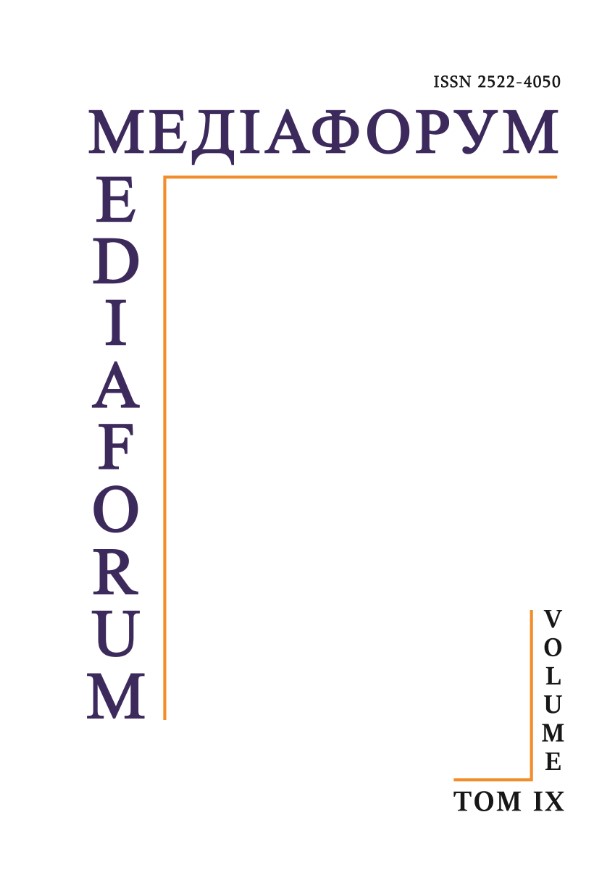Increasing the Popularity of Antisystem (Non-Traditional) Parties in the Czech Republic
DOI:
https://doi.org/10.31861/mediaforum.2021.9.50-63Keywords:
Czech Republic, political process, parliamentary elections, political parties, European Union, NATOAbstract
The article examines the course of the elections to the lower house of the Parliament of the Czech Republic, their role and place in the political process of the country. The author argues that pluralism of opinion and multiparty system in the Czech Republic practically confirm their real strength, as evidenced by the participation of many parties in parliamentary elections and the fact, that that nine of them managed to overcome the 5% barrier and to obtain a certain number of deputy mandates. The programs of parliamentary parties are analyzed, their main election slogans and the results they achieved in the elections. Much attention in the article is paid to the winner of this election – the centrist political force – movement "Action of dissatisfied citizens", whose leader was appointed Prime Minister of the Czech Republic. Emphasis is placed on new trends in the political process, which were confirmed during the will of the people. Among them, the author highlights the growing popularity of anti-system (non-traditional) parties. In their election statements, these parties set out to protest the change in the political system of society.
Along with this process, the crisis of traditional parties deepened, who were previously members of the governing bodies of the state, but they failed to demonstrate their compliance with voter inquiries, who sought solutions to pressing issues. This is confirmed by the results of traditional Czech parties – Communist Party of the Czech Republic and Moravia, which managed to get only 7.76% of the vote of the voters and the leader of the previous elections – the Czech Social Democratic Party, which won the support of only 7.27% of voters, having lost almost 13% of the vote in four years.
Downloads
References
Andrej Babish: Rossiya ne zainteresovana v dialoge s Chekhiej. https://420on.cz/news/politics/61160-andrey-babish-rossiya-ne-zainteresovana-v-dialoge-s-chehiey
Babish Andrej. Prem'er-ministr Chekhii. https://file.liga.net/persons/babish-andrey
Vishegradskaya chetverka v Evropejskom soyuze: dilemmy konvergencii. 2017. Pod red. L. N. Shishelinoj. M.
Vybory v parlament Chekhii vyigralo dvizhenie milliardera Andreya Babisha. https://aif.ru/politics/world/vybory_v_parlament_chehii_vyigralo_dvizhenie_milliardera_andreya_babisha
Zhukovskij A. G. 2011. Postmodernizm v politologii: metodologicheskie vozmozhnosti v issledovanii politicheskih processov. Sovremennye issledovaniya social'nyh problem (e-zhurnal). Krasnoyarsk. №4.
Itogi vyborov v parlament Chekhii prepodnesli nemalo syurprizov. https://riss.ru/article/3678/
Milliarder Andrej Babish vyigral parlamentskie vybory v Chekhii. https://www.rbc.ru/politics/22/10/2017/59ebbc1a9a7947cee101a4d0
Monitoring konstitucionnyh novostej. Chekhiya. Sravnitel'noe Konstitucionnoe obozrenie. 2017. № 6 (121).
Pan ili propal? Politicheskoe dvizhenie, vystupayushchee za otmenu sankcij protiv Rossii, pobedilo na parlamentskih vyborah v Chekhii. https://rg.ru/2017/ 10/22/intriga-vyborov-v-chehii-kto-vstupit-v-koaliciiu-s-dvizheniem-babisha.html
Parlamentskie vybory v Chekhii. https://www.rcoit.ru/news/58155/
Prem'erom Chekhii stal oligarh s somnitel'noj reputaciej. https://news. liga.net/world/news/premerom_chekhii_stal_oligarkh_s_somnitelnoy_reputatsiey
«U Chekhii i Rossii hudshie otnosheniya za 30 let». Chto nuzhno znat' o vyborah v Chekhii. https://rtvi.com/stories/u-chekhii-i-rossii-seychas-khudshie-otnosheniya-za-30-let-eksperty-o-vyborakh-v-chekhii/
Bleskový průzkum: Babišově vládě věří 45 procent lidí. Hlavně voliči ANO, SPD a KSČM. іROZHLAS. https://www.irozhlas.cz/zpravy-domov/pruzkum-duvera-babisova-vlada-andrej-babishnuti-ano-median_1712171040
Česko ochráníme. Tvrdĕ a nekompromisnĕ, slibuje voličům Babišovo ANO (2019). https://www.idnes.cz/volby/evropsky-parlament/2019/ano-start-kampane-volby-evropskyparlament.A190502_102544_volby_kop
Deklarace předsedů politických stran k zajištění obrany České republiky. 2015. http://www.natoaktual.cz/deklarace-predsedu-politickych-stran-k-zajisteni-obrany-ceskerepubliky-1q1-/na_zpravy.aspx?c=A140313_214039_na_zpravy_m00
Euromanifest ČSSD. 2001. Členství v Evropské unii – historická příležitost pro Českou republiku. Lidový dům, Praha.
Paleček R. 2015. Marketingová strategie hnutí ANO ve volbách do PS 2013. Bakalářská práce. Brno. https://is.muni.cz/th/ir6j8/Bakalarska_prace.pdf?so=nx
Parlament České republiky. Poslanecká snĕmovna. 2017-2019. Stenografický zápis 17. schůze, 12 července 2018. Žádost vlády České republiky o vyslovení důvěry. Parlament České republiky, Poslanecká sněmovna. psp.cz/eknih/2017ps/stenprot/017schuz/s017086.htm
Projev předsedy vlády na konferenci 15 let členství České republiky v Evropské unii. 2019. https://www.vlada.cz/cz/clenove-vlady/premier/projevy/projev-predsedy-vlady-nakonferenci-15-let-clenstvi-ceske-republiky-evropske-unii-173770
Ústava České republiky, ze dne 16. prosince 1992. https://www.psp.cz/docs/laws/constitution.html
Volební programy ČSSD. https://www.cssd.cz/ke-stazeni/volebni-programy/
Výsledky voleb do Poslanecké sněmovny 2017 – Česká republika. iDNES.cz. volby.idnes. cz/poslanecka-snemovna-2017.aspx














